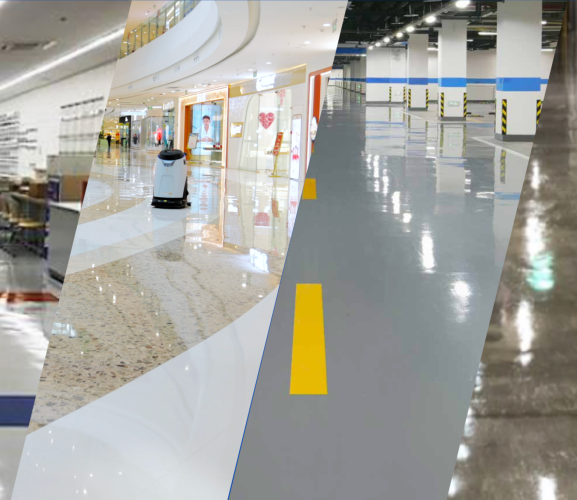When it comes to protecting and enhancing the floors of residential, commercial, or industrial spaces, selecting the right floor coating system is crucial. Floor coatings not only improve the aesthetics of a space but also provide critical functionality such as durability, moisture barrier, chemical resistance, and hygiene and safety enhancement. In this blog, we’ll explore various floor coating systems and the agents used in these systems, including their pros and cons, to help you make an informed decision for your flooring needs.
1. Epoxy Floor Coatings
Epoxy floor coatings are among the most popular and versatile flooring solutions. They consist of a two-part system involving a resin and a hardener. When mixed, these components create a chemical reaction that forms a rigid plastic material.
Advantages:
- Durability: High resistance to wear and tear.
- Chemical Resistance: Excellent for industrial environments.
- Aesthetic Variety: Available in various colors and finishes, including metallic and quartz.
- Longevity: long-lasting with proper maintenance, offering cost-effective long-term solutions.
- Maintenance: Easy to clean and maintain.
- Water Resistance: Preventing damage from spills and humidity, ideal for basements.
Disadvantages:
- Slippery When Wet: Can be hazardous without a non-slip additive.
- UV Sensitivity: Prone to yellowing and degradation under direct sunlight.
- Lengthy Curing Time: Requires several days to cure, potentially disrupting operations.
- Surface Preparation: Requires meticulous surface prep for proper adhesion, often needing professional expertise.
- Application Complexity: Involves precise mixing and application, best handled by professionals.
- Potential for Cracking: Can crack if the substrate moves, less suitable for areas with temperature fluctuations.
- VOC Emissions: Typically contain VOCs, particularly during the application and curing process.
Applications:
- Warehouses, Parking garages, Hospitals, Laboratories, etc.
2. Polyurethane Floor Coatings
Polyurethane (PU) coatings are known for their high flexibility and impact resistance. They are often used in areas where epoxy coatings might be too rigid.
Advantages:
- Flexibility: Resistant to cracking, suitable for areas with temperature changes.
- UV Stability: Excellent UV resistance, prevents yellowing, ideal for outdoor use.
- Chemical Resistance: Good resistance to chemicals, oils, and solvents.
- Durability: Resistant to abrasion, suitable for high-traffic and industrial areas.
- Aesthetic Variety: Available in matte to glossy finishes, enhances visual appeal.
- Quick Cure Times: Faster curing than epoxy, reducing downtime.
Disadvantages:
- Higher Cost: More expensive than epoxy coatings.
- Surface Preparation: Requires thorough preparation for optimal adhesion.
- Application Complexity: Complex application, often needs professional installation.
- Less Hardness: Not as hard as epoxy, less suitable for heavy-duty applications.
- VOC Emissions: May contain VOCs, especially solvent-based formulations.
Applications:
- Parking garages, Commercial kitchens, Pharmaceutical facilities, Cold storage areas, etc.
3. Acrylic Floor Coatings
Acrylic coatings are water-based solutions known for their ease of application and quick drying times. They are less durable than epoxy or polyurethane but are suitable for lighter-duty applications.
Advantages:
- Ease of Application: Simple to apply and dries quickly, reducing installation time.
- Affordability: Generally less expensive than other types of coatings, providing cost-effective solutions.
- Aesthetics: Available in various colors and finishes, allowing for customization to match design preferences.
- UV Resistance: Good resistance to UV light, suitable for outdoor use without significant yellowing or degradation.
- Lower VOC Emissions: Typically water-based, resulting in lower VOC emissions compared to solvent-based coatings.
Disadvantages:
- Lower Durability: Less durable than epoxy or polyurethane, requiring more frequent recoating and maintenance.
- Limited Chemical and Abrasion Resistance: Less resistant to chemicals and abrasion, making them less suitable for heavy-duty industrial use.
- Not as Strong: Lacks the hardness and strength of epoxy or polyurethane, limiting their suitability for high-traffic areas.
Applications:
- Decorative floors, Residential driveways, Sidewalks, Patios, etc.
4. Inorganic Glass Floor Coatings
Inorganic glass coatings, also known as silicate or glass coatings, are an advanced solution that forms a hard, glass-like layer on the surface of the floor. Compared to conventional resin-based coating agents as mentioned above, its primary component shares properties with glass, resulting in high hardness, exceptional protection and longevity.
Video: VFC , Gausium’s inorganic glass coating systems
Advantages:
- Hardness: Extremely hard and durable, providing superior scratch and abrasion resistance.
- Chemical Resistance: Highly resistant to chemicals, acids, and solvents, suitable for harsh environments.
- Water Resistance: Create a water-repellent surface, reducing the risk of water damage and enhancing longevity.
- UV Stability: Do not yellow or degrade under UV exposure, maintaining its appearance over time.
- Longevity: Offer long-term protection, often outlasting other types of coatings, reducing the need for frequent recoating.
- Aesthetic Appeal: Provides a high-gloss finish, enhancing the visual appeal of the floor surface.
- Lower VOC Emissions: Typically have lower VOC emissions than resin-based coating systems, making them environmentally friendly and safe for indoor use.
Disadvantages:
- Higher Cost: Typically more expensive than traditional coatings, requiring a larger initial investment.
- Professional Installation: Requires professional application due to the complexity of the process and specialized materials.
- Surface Preparation: Proper surface preparation is critical for optimal adhesion, adding to the overall complexity of installation.
Applications:
- High-end residential spaces, Commercial buildings, Laboratories, Areas requiring high durability and aesthetics, etc.
Conclusion
Based on the discussions above, we have summarized the properties of each floor coating agent in the table below, indicating their suitability for each property with a check mark (✓).
| Property |
Epoxy |
Polyurethane |
Acrylic |
Inorganic Glass |
| Superb Durability |
|
|
|
✓ |
| Chemical Resistance |
✓ |
✓ |
|
✓ |
| High Hardness |
✓ |
|
|
✓ |
| UV Stability |
|
✓ |
✓ |
✓ |
| Flexibility |
|
✓ |
|
|
| Ease of Application |
|
|
✓ |
|
| Fast Cure Time |
|
✓ |
✓ |
|
| Water Resistance |
✓ |
|
|
✓ |
| Scratch Resistance |
|
✓ |
|
✓ |
| Abrasion Resistance |
✓ |
✓ |
|
✓ |
| Low to Zero VOC Formulations |
|
|
✓ |
✓ |
Choosing the right floor coating system involves understanding the specific needs of your space and the benefits each type of coating offers. Whether you need the durability of epoxy, the flexibility of polyurethane, the ease of acrylic, or the advanced properties of inorganic glass coatings, there is a solution tailored to your needs. Investing in the right floor coating not only enhances the aesthetic appeal of your space but also ensures long-term performance and protection.

